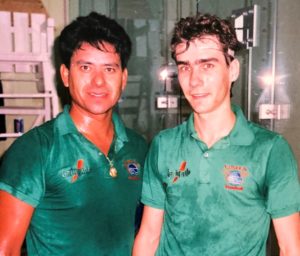(Note: This interview was originally posted on Patreon.com/wphlive and is brought to you today by those Patreon pledge members)
WPH Patreon Press
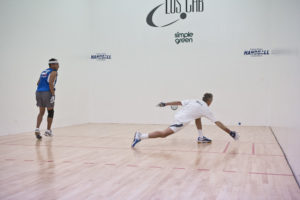 Danny Bell is a pro handball legend and a modern marvel that defies Father Time, regularly defeating professional players 40 years his junior. Bell played pro handball for more than three decades, reaching the USHA National Four Wall final at the age of 43 in 2005 and winning a pro stop 14 years prior, while remaining in the top eight for more than two decades. Bell played against and beat nearly all of the game’s greatest players from the mid 1980’s through the mid 2000’s and shares his journey in this WPH Patreon exclusive.
Danny Bell is a pro handball legend and a modern marvel that defies Father Time, regularly defeating professional players 40 years his junior. Bell played pro handball for more than three decades, reaching the USHA National Four Wall final at the age of 43 in 2005 and winning a pro stop 14 years prior, while remaining in the top eight for more than two decades. Bell played against and beat nearly all of the game’s greatest players from the mid 1980’s through the mid 2000’s and shares his journey in this WPH Patreon exclusive.
Danny continues to remain a threat on the handball court 35 years after making his professional handball debut, with Danny’s unique blend of dump kills, power serves, paddle kills, court savvy, and fist pumps making the Canadian legend one the most exciting players to watch and one of the most difficult to play. Bell won three open tournaments at the age of 58 in late 2019 at a time when most legendary athletes have long retired to the golf course. Danny’s fitness and passion for the game is virtually unparalleled, inspiring his peers and the next generation, while leaving the rest of the handball world awestruck.
In part one of this exclusive three part Patreon interview with the Canadian superstar, Bell discusses his start in the game, his coach and greatest influence, his early tournament successes, his greatest inspirations, and much more. Enjoy!
All pictures courtesy of Danny Bell and the WPH
How did you get your start in handball?
I started playing Handball when I was 12 with my brother Michel (14), my dad used to work in a sports center and we had swimming class and after the class we had to wait for him to finish work so he gave us an old tennis ball to use in a squash court. Best time of my life playing my brother with my dad watching from the top. We never laughed that much in our life. We had a grueling rally that lasted forever and the only reason the volley ended is because we were laughing too much. Me and my brother were always very competitive in every aspect, I always wanted to beat him at everything we played and that probably developed my competitiveness more than a lot of people. Just like Michael Jordan and his older brother (if you guys watch the Last Dance on Netflix). I’m far from being Michael Jordan but some people will agree that I have that kind of competitiveness in me.
Who was your coach and greatest influence in handball?
After a few weeks playing with my brother we met Donald Côté and Alain Pélissier who were playing at that facility and they decided to train us for competition.
They have been my coaches ever since. Donald was around more often because Alain moved out of town after a few years but they were and still are the greatest influence on my handball career. I cannot thank them enough for that.
What were your first tournament wins and why those wins were important?
I had a few wins as a junior player but the best first win is when I won my first provincial tournament in the Open division when I was 19. I had to go through guys like Gerard Caya , Jacques Corneau and Richard Vandal in those days (all three from Montreal).
But my biggest win at that age is when I won the BIG APPLE tournament at the West Side YMCA in NY in January 1981. I was still 19 beating Marty Law in the final.
By the way, my best friend Denis Gingras beat Mike Tyson in that tournament with Jimmy Jacobs watching from upstairs.
What was your greatest inspiration to improve and become a pro?
In 1979 Donald and Alain organized a pro stop in Québec city and I had the chance to watch the best player ever, Naty Alvarado and at that time, I decided that I wanted to become a pro. Donald Côté had traveled to Arizona a few years before and brought back an autograph from Naty that I still have.
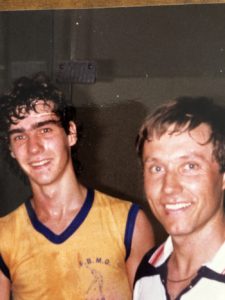
What was your breakthrough win or tournament?
Of course when I won the Big Apple Tournament I felt invincible but Donald brought me back to heart by taking me to a lot of tournaments in those days and I was losing to guys like Kenny Ayube, Roger Berry, and Merv Deckert (of course), another of my idols.
It made me realize that I had a lot of work ahead of me to become a pro. Then in May of 1984, Donald and Alain organized another Pro Stop in Quebec City and I had the chance to qualify, beating Tom Blaikie in the final round – Tom was at the top of his game at the time, he made the semi-final at the Nationals in 1983 in Houston the previous year I think. Then in the first round of the pro, I lost to Big John Sabo who was number 3 or 4 at the time. I lost 11-9 in the tiebreaker. (by the way Jaime Paredes won that pro stop against Vern Roberts and became one of my inspirations as well. *Writer’s note: more to come on Jaime Parades in an upcoming exclusive two-part interview). That time I really thought I was ready to become a pro. But Donald insisted that I play in the 23 and under at the US Nationals in Baltimore the month after to get a National Title. Tim Labey brought me back to heart by beating me in the semifinals – another good lesson.
The following summer, a group of handball friends, led by Donald, Alain and my brother, organized a benefit party to raise money for me to go on the pro tour the following season.
So, I went to Denver for the first pro stop of the season. I did not qualify, I lost to Todd Worrell. For more than two years, I went to 14 qualifiers and qualified at 12 of them, the only two times I didn’t qualify was in Denver (I guess it’s the altitude hahaha). Back in those days the top 12 players were invited and there was room for 4 qualifiers. You had to travel on Monday to play 2 rounds on Wednesday and 2 more rounds on Wednesday and then play a top 12 fresh player on Thursday. I finally got on the top 12 after 14 tournaments when I beat Jaime Paredes in California in the first round.
From that moment I stayed on the top 12 for over 20 years. Top 8 for around 15 years and being no 2 for a month and no 3 and 4 for a few years.
What has been your best moment on the court?
Wow tough question, there are so many. Like I said, probably playing my brother Michel from 12 to 17 – it’s weird because I was losing all the time and it was the best of times. Then again the best times are all defeats. Every time I had the chance to play the best player in the world were the best times in the court. The 10 times I played Naty Alvarado and the 11 Times I played David Chapman added up to 21 defeats all together but a lot of close matches and five or six tiebreakers between the two.
The most memorable is at the NYAC when David was at his prime. Sports Illustrated was there to make a big interview with him. We played in the quarters and there were probably 40 Quebecers in the stands cheering for me. We were at 9-9 in the tiebreaker and I was serving, I looked at David before I served and I told him that it was fun. He looked at me and I wasn’t sure if it was fear in his eyes or determination. I then served and we had a long volley and I was in control, making him run around the court and then I made the perfect pass shot – he had to run toward the back wall and dive to get the ball back from the back wall at 1 millimeter from the ground, he made the get because I saw it very clearly and the ball was travelling slowly toward the front right corner and I was right there to make an easy get and he was still on the floor against the back-wall but that dam ball rolled out right in front of me, I guess my pass shot wasn’t that perfect for David Chapman!
The crowd couldn’t believe he made the get because the way the stands are at the NYAC is impossible for the crowd to see the low back-wall part.
I gave him a hand while he was going back in the service box and he served two points to win the match.
Of course, I had a lot of wins to be proud of as well that provided me some of the best moments in the courts.
- Beating Merv Deckert for the first time at the Canadian Nationals (my childhood Idol and still my idol). That win gave me qualification to represent Canada at the World Championships in Australia, where I had the opportunity to play my other idol Naty Alvarado in the final, one of my 10 defeats against him.
- Winning the Canadian doubles with my best friend Denis Gingras.
- Winning the US Nationals doubles with another of my best friend Charlie Kalil in 1989 in Chicago. That year I lost to Poncho Monreal in the quarters 11-7 tie breaker and he ended winning the tournament, beating Jon Kendler in the final.
- Winning the World Doubles with David Chapman in Chicago also in 2000 (I should go to Chicago more often)
- Making the final against Paul Brady of the US Nationals at the age of 43 and 9 months (these 9 months are important believe me) in 2005 in Houston. But beating Allan Garner in the semi-final and Naty Alvarado jr were two of my best wins.
- Winning my only Pro Stop in Atlanta against John Bike with all the top players being present (Alvarado Sr. included) in 1991.
- Winning the Albany Open last year – Danny Bell Wins the 2018 Albany Open HERE
- Of course winning all these Canadians Nationals was satisfying but winning the last one last year was unbelievable – Danny Bell Wins the 2019 Canadian Nationals HERE
Biggest disappointment on the court (one that you still think about)?
God, I hated that question for years. But not anymore.
My defeat against Poncho Monreal at the World Championship in Phoenix in 1991.
I had won the Pro Stop three weeks before.
I thought about that defeat for 27 years.
We always have a reason why we lose and mine was a nutrition error. I waited too long before I ate the night before, because I was waiting for my friends to finish their matches, so I didn’t eat enough and the next morning I was nervous I guess and didn’t have a big breakfast. Then the match was postponed a few hours and I didn’t eat anything else. So during the match I suffered Hypoglycemia and had no energy at all in the second game. I still don’t know how I managed to finish that match on my two legs. It was nobody’s fault but my own. It’s not an excuse but an explanation. Of course, all the good shots that Poncho hit were also an explanation.
I analysed that defeat for years and had regrets until two years ago when I attended a conference on sport psychology, which is part of my regular job in real life with elite athletes and I was able to come in peace with it. Thanks to that intern in sports psychology.
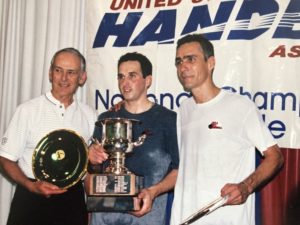 Could you talk about the comeback in the 2005 USHA Nationals. At 44 years of age, you trailed Allan Garner 3-9 in the tiebreaker and came back to win 11-10 to advance to the final. How did you do it?
Could you talk about the comeback in the 2005 USHA Nationals. At 44 years of age, you trailed Allan Garner 3-9 in the tiebreaker and came back to win 11-10 to advance to the final. How did you do it?
I tell you what, HAPPINESS did it. Let me explain:
The year before, in March of 2004, coming back from Seattle and Alaska from back-to-back Pro Stops (two of the best tournaments ever that I have participated in with tremendous prize money, thanks to Jim Peixoto) my wife of twenty something years left me. So for eight months it was a very difficult time. Thanks to all my friends that supported me, especially Denis Gingras, Donald Côté, John Bike, Naty Alvarado Jr,, Tyler Hamel and I could go on and on and on. They convinced me to still come to tournaments even if the desire to win wasn’t there. Even in May of that year, I won the Canadian Nationals beating the great Merv Deckert in the final while crying in the service box.
Then in November, eight months later I met Marie and it changed my life completely, I became the happiest man in the world and still am.
For twenty something years at that time on the tour and being seeded number 2-3 and 4 for a while I had never passed the quarters at the Nationals.
When I showed up at that Nationals in June of 2005 I was floating on a cloud, and when you do, you can probably achieve anything. I sadly beat Naty Alvarado Jr. in the quarters, the number one or two seed at the time. I say sadly because I felt bad for my friend Naty Jr., who I consider one of the best warriors as an athlete in the world.
I then had to face that young gun from San Antonio with tremendous power.
At that time, I felt invincible and wasn’t nervous at all, I also had nothing to lose at all. I made my first ever semi-final showing at a Nationals and I was satisfied, so I had no stress entering the semi-final. I was also about 25 years older than Allan.
So I just played my game and was flying in the court almost effortlessly.
I had the chance to play a court with a glass side wall on the right side.
At the time my best serve was my power serve down the right. And I think Allan had trouble with it.
In that comeback from 3-9 to win 11-10, I made 5 or 6 aces with that serve.
The next day playing Brady my mind was still flying but not my legs Ha! Ha! Ha!
That day was historic, it was the first time ever that there was not a US player in the final of the US Nationals, it was an Irish player and a Canadian player! And I’m not sure but people say that I was the oldest player ever to make the final. Something I am proud of.
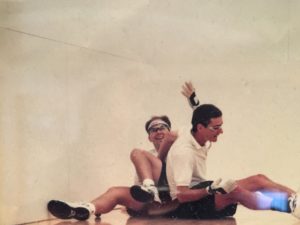 You added the dump kill and paddle kill to your game in your 30’s and quickly perfected those shots. How did you develop those shots and how do you hit them so consistently?
You added the dump kill and paddle kill to your game in your 30’s and quickly perfected those shots. How did you develop those shots and how do you hit them so consistently?
Actually, I developed these shots more in my late 30’s and beginning of my 40’s.
By watching the great David Chapman play, I realized that there was no point to hit the ball at a hundred miles an hour all the time. He was beating everybody effortlessly by using those soft shots. And at the time I had big shoulder and elbow problems, so when I was practicing back home I started to develop them, even though I had closer matches with my friends back home, I didn’t care. A lot of people thought I was on a down slope but I knew I was just changing my style to save my body from the pain and being able to play longer. I wanted a Chapman kind of style. I was very dedicated to practicing those shots and it paid off, I surprised a lot of the top players with these shots back then. I still surprise them today when I play someone new and he’s not used to it.
Who was your greatest rival during your pro tour career?
Of course I have to name the best, like Deckert, Alvarado, Chapman, Brady but I would have to say probably John Bike because we are best friends. We were rooming together on the tour for a long time and we had to play against each other very often. It was tough to put friendship apart during our matches because we were both warriors. We used to both go practice together the morning of a match and had to face each other later during the day. We had great fights over the years but these fights stayed on the court.
Who was your toughest opponent on the tour and why? :
Easy question and short answer.
I’m 0 and 10 against Alvarado Sr and 0 and 11 against Chapman.
Of course Brady was not easy to play either.
Who were your handball heroes?
- Merv Deckert : determination , calm , never gives up.
- Naty Alvarado Sr.: spectacular, fast, athletic.
- David Chapman : intelligent, intelligent, intelligent.
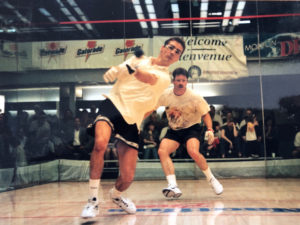 What would you tell an aspiring pro player who is trying to reach the heights that you reached in pro handball?
What would you tell an aspiring pro player who is trying to reach the heights that you reached in pro handball?
I’ll tell them to call my coach Donald Côté Ha! Ha! Ha!
Just try to be happy at what you do and train, train, train.
And referee matches, I had the chance and the guts to referee a lot of big matches during my career and that alone helped me to learn a lot from the best players because I was really focusing on everything they did.
How difficult was it for you to step away from the pro tour?
Not too bad to be honest. Actually, in my mind I think I could still play on the tour but my lifestyle has changed a bit with a job that I love and it took a lot of time away for me to travel. I also had a herniated disk at the age of 50 and that forced me to stay away from the game for a year. That was a tough year and then I came back for 6 months and I tore a muscle that took another 6 months to recover. So now I’m just happy to be able to play. And still at a high level surprisingly. (Writer’s Note: In Danny’s last start at the WPH R48 LTE/SR48 RFC, Danny beat four high open players, three of whom were 20 years or more younger than him. In short, Danny can play with anyone in the world!)
How difficult was it for you to step away from the pro tour?
Not too bad to be honest. Actually, in my mind I think I could still play on the tour but my lifestyle has changed a bit with a job that I love and the tour took a lot of time away for me to travel. I also had a herniated disk at the age of 50 and that forced me to stay away from the game for a year. That was a tough year and then I came back for 6 months and I tore a muscle that took another 6 months to recover. So now I’m just happy to be able to play. And still at a high level surprisingly. (Editor’s Note: In Danny’s last start at the 2020 WPH R48 LTE/SR48 RFC, Danny defeated four high open players, three of whom were 20 years or more younger than him. In short, Danny can play with anyone in the world!)
What do you miss most about playing pro handball?
FRIENDSHIP, I have travelled so much that most of my best friends are living away from me.
I like to call them my family : The Bike’s , the Alvarado’s , the Shelgren’s, the Kalil’s, Tyler Hamel, Peter Service, Ken Ayube, the NYAC family, Jaime Paredes, Merv Deckert, Jeff Wilson, Roberto Meneses and so much more, all my doubles partner over the years, Robles, Klarman, Armijo, Rusing, just to name a few (I can`t name all of them it would take forever). I could go on and on forever … My Japanese family, my Irish family. I miss the great ones, Duxie and David.
What is the importance of growing the game and playing everyone?
Of course it’s important and necessary. Thanks to Dave Vincent and yourself and all the tournament directors around the world and sponsors like your dad (Rodney Fink) who are doing a lot to save our beautiful sport. Even though four wall handball lost some popularity in participation, at least one wall and three wall are growing up and are probably the future of handball because it can be played outside bringing great exposure to the game. There is maybe a solution if we all work together to promote the sport of handball.
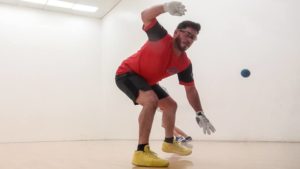 How would you compare the style of game of the pros on the tour during your run to the pro style in today’s game?
How would you compare the style of game of the pros on the tour during your run to the pro style in today’s game?
Well, I’ve been through a lot of styles during my career: I got on the tour when Fred Lewis was still on and he was getting everybody dizzy with his wrap around and ceiling shots.
Of course the speed of the ball has changed over the years and the newcomers like Munoz, Silverya, Alvarado Jr., just to name a few were using more power and speed than anybody else before except probably for Alvarado Sr. and a couple of others.
So the game became different with a lot of speed and still with relatively long volleys.
Today’s ball is still faster and it’s now all power with shorter rallies, I think, but very spectacular gets – Killian, Cordovas, Lenning, Armando (one of my favorite players).
Which pro players do you enjoy watching on the Race 4 Eight tour today?
Most of them, but at the last World in Minneapolis a couple of years ago I really liked watching all the top young Irish, the Cordovas, Sean Lenning is always a pleasure to watch, Marcos Chavez and you David of course representing the old guys. But my favorite is Armando Ortiz, he reminds me of Vince Munoz, another of my favorite players to watch back then.
Who would you have liked to play in today’s game when you were in your prime?
All of them, but like I said I’ve always wanted to play against the best so I would say Killian Carroll. We played 3 years ago in Albany and he kicked my ass, so I guess I would pick him first.
In your late 50’s, you are playing at an incredibly high level, winning three straight open tournaments in 2019 and capable of beating just about anyone on the planet. How do you do it?
Tough question, I don’t know for sure to be honest.
I guess the love of the game and my competitiveness. I must add that having recovered from injury has brought back the appetite to play and win.
I’m lucky to still have a couple of good players that push me here in Québec City, like Jerome Santerre, who is also a warrior and has an unconditional and obsessive desire to beat me someday and he did a couple of times lately in practice. He also has the desire to get on the tour and is working very hard to achieve that goal. I wish him the best but he will not have it easy with me.
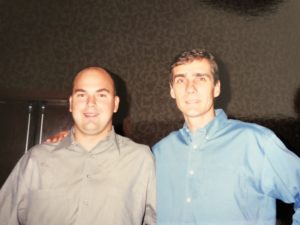 How can handball players continue to improve into their 50’s?
How can handball players continue to improve into their 50’s?
Have fun, train for fun, stay in shape, luck and learn from the young and the old pros.
Word Association
Killian: determination and focus
Brady: WOW WOW WOW actually I realise I haven’t talked enough about this tremendously great player.
Merv Deckert: Childhood hero
Canadian Nationals: hope to be able to defend my title again.
Ivan Burgos: future of Canadian Handball along with Jerome Santerre and Michael Gaulton.
It was a pleasure to do this interview and I want to take the opportunity to say I’m sorry to all the referees that I gave a hard time toward my career. I was not and still not an easy player to referee. My competitiveness has taken over my emotions very often and I’m sorry for that.
And thank you for giving me the opportunity to express my handball feelings and talk about my career to all the handball fans out there.
Stay safe everybody
Writer’s Note: What a thrill for all handball fans to have a chance to relive one of the greatest in history of the game’s ongoing journey. Thank you Danny!
Pictures courtesy of Danny Bell and the WPH
David Fink
WPH Senior Writer










